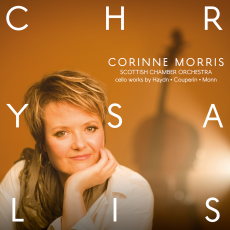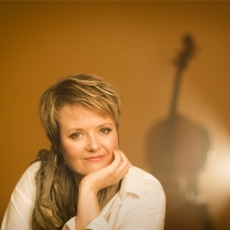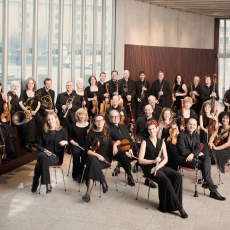Corinne Morris & SCO - Chrysalis - Gramophone
At the risk of sounding like a right old witch of a critic, I’m a fan neither of recordings with poetic titles nor of musical offerings in general which come with a heart-rending/inspirational human story attached. The latter of those two just comes a little too close to the ways televised talent shows such as The X Factor up the emotional ante, and in my book a performance should be able to do its wooing with no additional help.
So enter ‘Chrysalis’ stage right, named after ‘the process whereby things change, develop, progress their form and yet somehow stay intrinsically the same’, and billed as the British-French cellist Corinne Morris’s comeback album after over five years out of action due to a shoulder injury. Truly a package capable of sending me running for the hills, even with the reassuring presence of Linn Records and the Scottish Chamber Orchestra on the ticket. Yet its musical contents are fantastic.
The first thing to strike you about ‘Chrysalis’ is that, compared to other Haydn C major Cello Concerto recordings, it has one of the more interesting surrounding programmes. In fact the Haydn isn’t being pitched as the headline act at all but as the final of three equally weighted points on a journey from the Baroque to the Classical style and which thoughtfully melds the old and new. Performed on modern instruments in a historically aware manner, it opens with Paul Bazelaire’s 20th-century arrangement of Couperin’s Les goûts-réunis – Baroque repertoire filtered through an early 20th-century Romantic lens. Next up is Monn’s exquisite G minor Cello Concerto, and for this transitional-period work they don’t use the popular Schoenberg arrangement (as heard on Queyras’s Haydn C major recording – Harmonia Mundi, 10/04) but instead a cleaner, more pared-down edition closer to Monn’s original notes; in other words they’ve tried to take it back to its time. Then, while the Monn features a harpsichord, for Classical-era Haydn they’ve made a clean break with the Baroque and stuck to what’s in the Urtext, ie no keyboard continuo.
The playing is beautiful too. Morris, directing the graceful SCO from her cello, brings a beautifully smooth, darkly glowing tone and immense lyricism to all three works, a lyricism that reaches its apotheosis in the truly slow Adagio of the Haydn (featuring her own cadenzas), which at 9'09" is as much as two minutes slower than some others. Gorgeously so, too, with not a hint of sluggishness.
I do wish that Morris and Linn had had the confidence to present this recording as a straight musical package, because its contents didn’t need any peripheral help.


